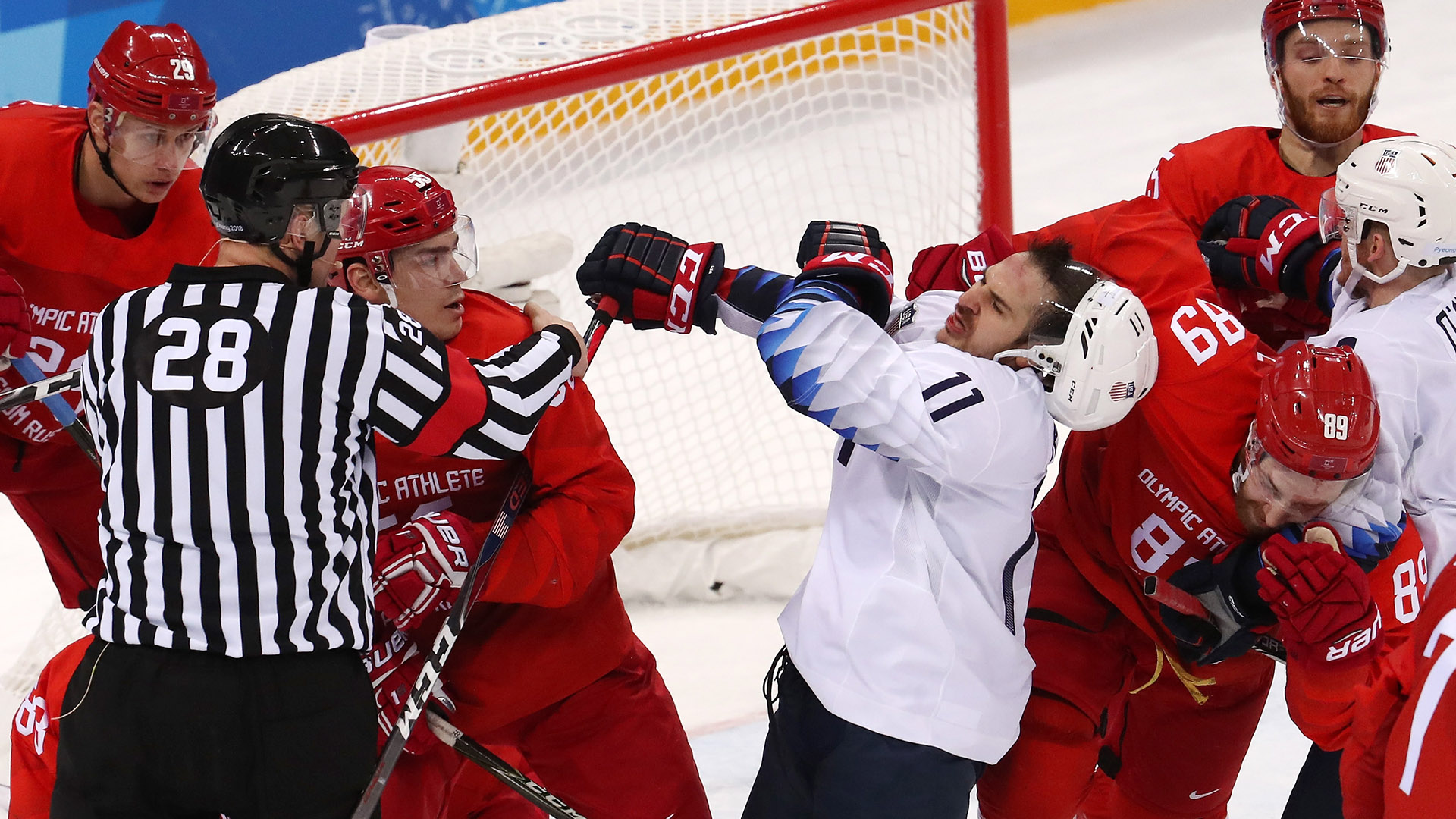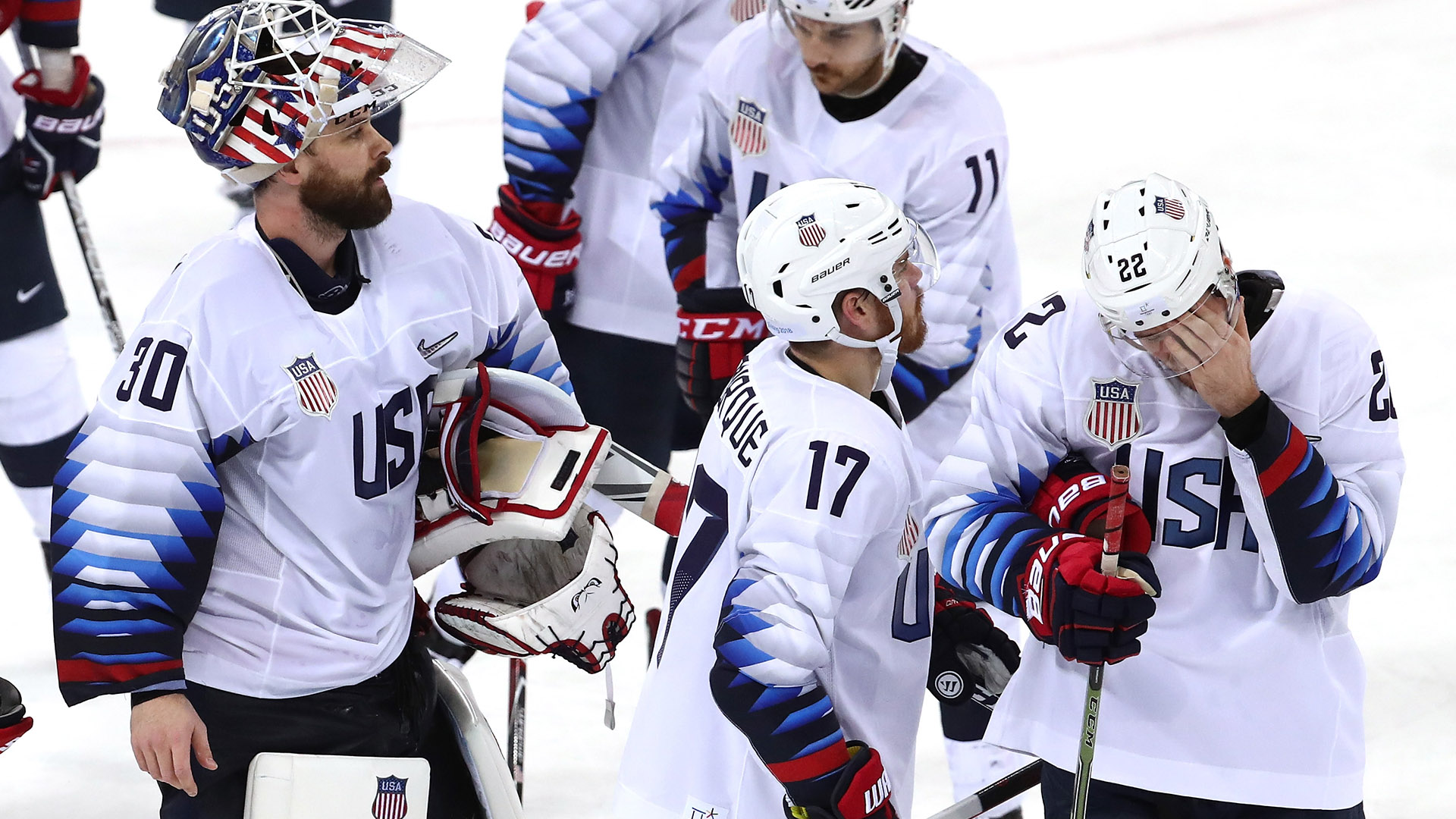GANGNEUNG, South Korea — The Russian wound up for a one-timer, watched it whizz past the American goaltender with 0.2 seconds left in the period, turned around and crossed his arms. Then Ilya Kovalchuk – yes, the same Ilya Kovalchuk who scored 417 NHL goals – released them downward in a gesture that needs no translation.
It’s over.
The game, sure. That was probably over well before Kovalchuk’s blast to make it 3-0 on the way to a 4-0 victory. More to the point, it ended any illusion that this U.S. team, bless their hearts, is a threat to do anything significant at these Olympics.

And you know what? For the first time in years, there’s no reason to get angry about that and nobody to blame. Under normal circumstances, that would and should be our natural impulse if USA Hockey showed up at a major tournament with a team this poorly equipped to compete on the international stage.
But these aren’t normal circumstances. And with the NHL sitting this one out, the Americans are who we thought they were.
“I thought it was a great game,” said coach Tony Granato, who spent much of his postgame news conference bemoaning the post his team hit in the first period and a botched breakaway in the second. “I didn’t think it was a 4-0 game.”
He’s right. It just as easily could have been 6-0.
If you’re an American hockey fan who woke up Saturday morning and got steaming mad watching the Russians – oh, sorry, Olympic Athletes from Russia – toy with this team, don’t bother. If you’re inclined to criticize Granato or the late Jim Johannson, who built this roster before he passed away suddenly last month, save your breath.
As discouraging as it may be, this Team USA debacle isn’t reflective of the state of American hockey. It’s merely the bad byproduct of a bad decision by NHL commissioner Gary Bettman that robbed ascendant American stars such as Auston Matthews, Jack Eichel and Johnny Gaudreau a legitimate chance to win the first hockey gold medal for the U.S. since the Miracle on Ice.
Hopefully, for the sake of American hockey, their day will come in Beijing four years from now.
But in the meantime, it would be foolish to funnel much emotional energy into this team, as admirable and scrappy as it may be.
While Granato was grasping hard for positives Saturday night, it doesn’t change the fundamental calculus: There’s a massive talent gap between the U.S. and Russia, where the Kontinental Hockey League has dozens of players who are good enough to make it in the NHL but choose to stay home for big paydays.
It’s really not that complicated. A Russian team headlined by Kovalchuk and a slightly-past-his-prime Pavel Datsyuk is going to be better than the collection of college kids and Americans who are a step below the NHL level pretty much every time.
“This team’s made up of two teams in the KHL, so they know what they’re doing,” U.S. forward Ryan Stoa, who plays for Spartak Moscow in the KHL, said. “They’re familiar with each other. They played together for a long time. This what they live for. Unlike in the States where hockey’s maybe the third or fourth sport, over there everybody plays hockey. You have a ton of talent on both teams, they just executed better tonight.”
But to characterize Team USA’s issues as exclusively a Russia problem would be underselling the magnitude of upset it would be for this team to win a medal. During the three games in pool play, the U.S. went 1-1-1 and scored four total goals, beating Slovakia 2-1 and losing to Slovenia 3-2 in overtime.
In the buildup to the tournament, USA Hockey made it seem like a big mystery what this team was going to look like once it got on the ice against teams that were similarly thrown-together with B-level players. But it turns out the answer was hiding in plain sight.
When your best goal-scorers are nearly 40 years old (Brian Gionta), longtime minor-league players (Chris Bourque) and a kid who’s been playing for Harvard this season (Ryan Donato), you’re going to have trouble scoring goals. When your goaltender, Ryan Zapolski, was pulled out of Finland via the ECHL, well, it’s not really fair to expect Mike Richter.
“We have another game in a few days,” Zapolski said. “It’s win or go home now, and I hope we’re going to show our best. We did a lot of good things the first three games but we just haven’t found a way to score enough goals. It’s going to come with more time so we have to find a way to buckle down now.”
The U.S., however, has no more time. It’s now a single-elimination tournament, and there’s nothing – absolutely nothing – from the last week to indicate the Americans are on the verge of an incredible run. If anything, getting outclassed by Russia should be a splash of ice-cold reality about what this team is capable of.
“I’d like to play this team again sometime,” Granato said. “I think they respect us for how hard we played. I think they realize they were in a pretty good fight out there.”
Before the tournament, Granato was emphatic that it wouldn’t take another Miracle for the U.S. to win. After watching them against the Russians, though, you have to wonder if even that may not be good enough.


